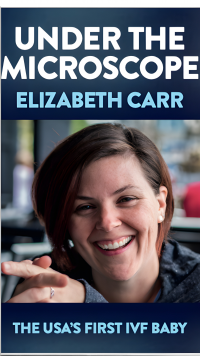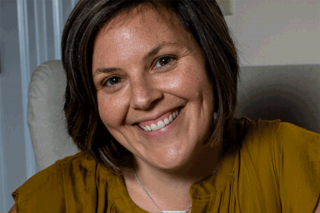“I have been in the media and press since before I was born,” says Elizabeth Carr ’04, who, in 1981, made headlines as the first United States baby born via in-vitro fertilization (IVF).
At the age of seven, Carr’s special status began to crystallize within her consciousness: “I watched a NOVA documentary of my own birth, which featured my medical team, reproductive endocrinologist Dr. Georgeanna Seegar Jones [d. 2005] and her husband, gynecological surgeon Dr. Howard W. Jones, Jr. [d. 2015], who helped make this technology possible in the U.S.” The fertility treatments were conducted at East Virginia Medical School (Norfolk), as IVF was illegal in her family’s home state of Massachusetts at the time. “Upon seeing the film, I thought, ‘Wow, everybody went through a lot of fuss to bring me into the world.’”
Although Carr’s parents, Judith and Roger Carr, had the option to remain anonymous, they made themselves known to the press with the hopes of normalizing reproductive technology. “Back then, IVF was a revolutionary technology that could be a real game changer for helping people build their families,” she explains.
A Born Advocate
During the day, Carr works as a public relations and marketing specialist for Genomic Prediction, a pre-implantation genetic testing company. Specifically, these tests and embryo screenings increase the success of fertility treatments and reduce the risk of miscarriage and genetic diseases.
Elsewhere, Carr is a dedicated fertility advocate. Through her publications, podcasts, speaking engagements, and media appearances, she guides people through the complex terrain of fertility technology. “I’m on a mission to educate and empower people and organizations to better navigate the complex and ever-changing world of infertility and crush the stigma that still surrounds reproductive options,” she says.
Specifically, Carr helps patients advocate for insurance coverage, given that many states have not mandated insurance companies to cover reproductive technologies. (In 1987, Massachusetts became the second state to cover IVF procedures). Carr helps her clients understand what kind of options — including IVF, donor eggs/sperm, Intracytoplasmic Sperm Injection (ICSI), and Intrauterine Insemination (IUI) — are available to them.
“Most people don’t know about these options until they are in the thick of trying to start a family. . . . Even if some people never require medical interventions to procreate, it is important that everyone knows this information,” she says.
Carr’s counsel is rooted in realism and integrity. For instance, she identifies a problematic behavior that she calls “reproductive toxic positivity.” As Carr explains, “Whether or not IVF, for example, is covered by insurance, patients endure many emotional and financial hardships in order to build their family. If someone has tried and been unsuccessful with IVF, others may simply say, ‘Try it again,’ or ‘Next time you’ll have a better chance.’ But anyone who has spent tens of thousands of dollars on treatments knows that it is not that simple. Undergoing fertility treatments is not all sunshine and rainbows, and we should not sugarcoat it.”
Carr’s advocacy extends to the political sphere. She has been especially involved in The Right to IVF Act. Co-sponsored by Senator Tim Kaine, this bill proposes that “individuals have the right to access fertility treatments and to make decisions about the use of their reproductive genetic material (e.g., embryos) without limitation or interference. Healthcare providers and insurers have the right to provide and cover these services, respectively. Manufacturers of applicable drugs or devices also have the right to provide these drugs or devices.” Senator Kaine invited Carr to the 2024 State of the Union as his guest.
Despite Senator Kaine’s and Carr’s efforts, the bill has not passed, failing twice on the Senate floor. “And yet, The Right to IVF Act is extremely simple,” says Carr. “It just allows people to access the reproductive technology they need and permits hospitals to offer it. This is the easiest legislation to support, but the fact that it has not yet passed shows that more lip service than meaningful action has been made.”
Nevertheless, Carr finds her career rewarding, both personally and professionally. “The whole thing about education and advocacy is that one person can really make a difference. And I am humbled and gratified to see this firsthand, even if the results are not immediate,” she says. “People contact me and share how my support and advocacy made an impact on their lives.”
Historicizing her Life

In 2021, Carr co-authored a memoir with Martin Powell, a UK-based IVF historian. Entitled Under the Microscope: The USA’s First IVF Baby (Bristol Books), Carr historicizes 40 years of her life under public scrutiny. “The book is about my life and my memories, and how they correspond to historical moments and advances in reproductive technology,” she says.
“The general idea for this book was quite simple,” Carr recalls. “I wanted to write something for my 14-year-old son. He had heard about my birth through the press but perhaps did not understand the historical weight of it all. I decided to create an easy, engaging way to explain this to him.”
When Carr drafted the manuscript, she did not intend for the work to be published. “But because I am a journalist, I know that every writer needs a good editor, so I sent the manuscript to my editor. He wanted me to publish it.” Carr’s publisher, Bristol Books, also published a memoir by Louise Brown (b. 1978), the world’s first IVF baby and a friend to Carr.
In Carr’s view, it is important to disseminate these kinds of stories. “By and large, IVF is still a rather taboo topic,” she notes. In response to the February 2024 Alabama Supreme Court ruling that frozen embryos constitute “extrauterine children,” Carr wrote for WBUR: “No one understands better than the infertility community that embryos are not children. Success in IVF means bringing home a baby, not solely creating embryos.”
Mentorship and Opportunity at Simmons
Before Carr applied to college, her father convinced her to take a weekend course on writing college essays offered by Simmons. “Professor David Gullette taught the course, and I adored him [and later took his Shakespeare course],” she says. “As soon as I set foot on campus, I just fell in love with the people, the community, and the vibe. I even recall the freshly cut flowers in the bathroom. I ended up applying for early admission and was one of the first applicants admitted to the Class of 2004.”
At Simmons, Carr majored in Communications. “I was drawn to this field because I had been in the media my entire life,” she says. “At a certain point, I realized that reporters don’t always do their homework or ask the best questions. I thought I could do a better job and treat people better than I was treated. So, by the time I got to Simmons, I knew that I wanted to cultivate a career in journalism.”
When Carr studied at Simmons, Boston Globe Columnist and Associate Editor Derrick Jackson served on the Department of Communication’s faculty. “I took a particular interest in his courses and ended up interning at the Globe when I was a sophomore at Simmons. Later in my career, I returned to the Globe, where I worked for 15 years.”
Carr is especially grateful for the preparation, mentorship, and internships that she received at Simmons. “I had better access and training than most other journalism students because I received personalized attention. I think that’s what makes Simmons so special.”
Simmons’ longstanding commitment to social justice and equity nourished Carr’s instinct for advocacy. “Simmons had an impact on my willingness to advocate for others and my ability to speak up on their behalf,” she says. “I distinctly remember that our Class of 2004 slogan was ‘Find Your Voice.’ The running joke with all my friends from Simmons — with whom I am still very close — is that we have found our voice and will not be quiet.”
Carr advises Simmons students to keep an open mind, intellectually and socially. “I took classes on all the required courses, and many other [different subjects]. To my surprise, some of them turned out to be my favorites . . . Always take the opportunity to broaden your knowledge,” she says. While Carr did not anticipate attending a women-centered college, “I did not close my mind to the idea. . . . Once I landed in that environment, I really thrived.”

